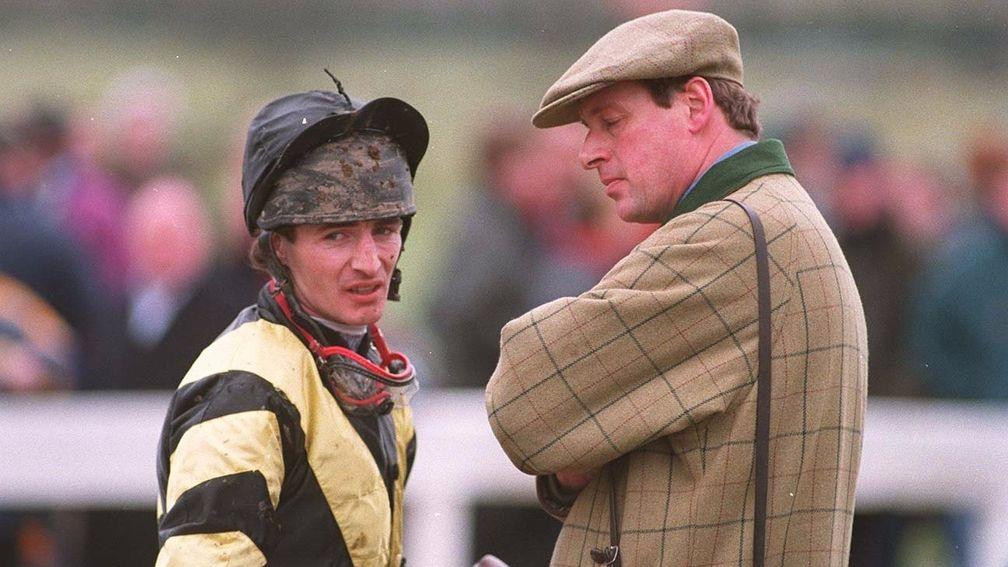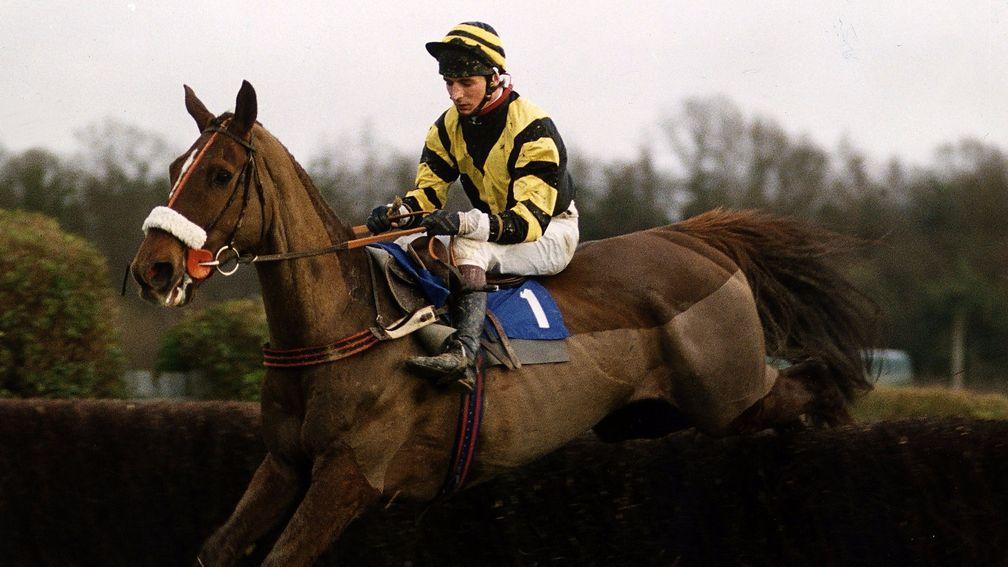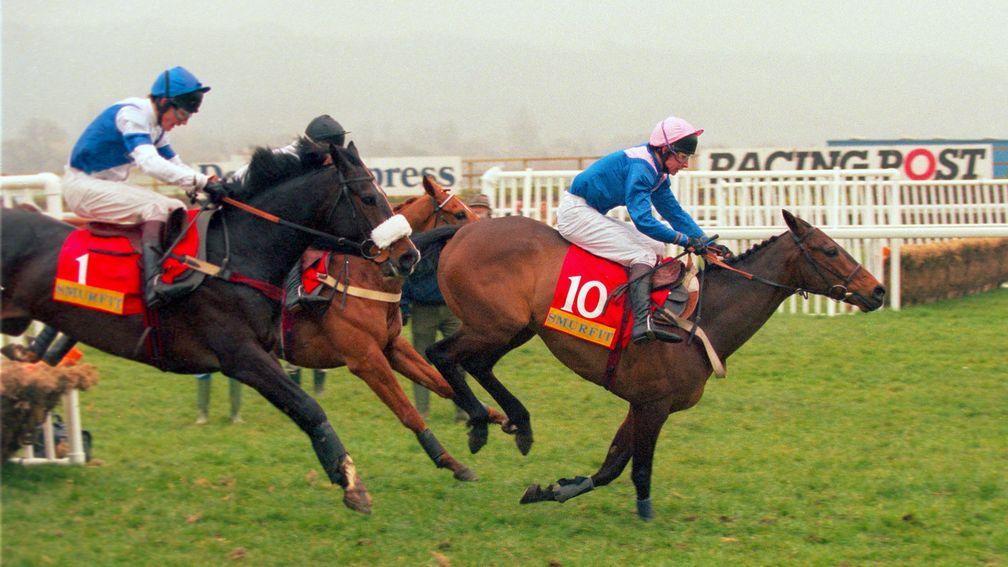Conquering heroes relive golden year

On the 20th anniversary of a memorable Champion Hurdle-Gold Cup double, Nicholas Godfrey talked to Kim Bailey and Norman Williamson
Nostalgia can be bittersweet: a rosecoloured trip down memory lane haunted by the ghost of Christmas past. In a long and distinguished training career, Kim Bailey has seen both sides but now, as he prepares for his latest visit to nearby Cheltenham, he is able to reflect on a once-in-alifetime experience 20 years ago. At the 1995 Cheltenham Festival he and Norman Williamson earned their place in racing folklore when they became the first trainer/jockey partnership since the legendary Vincent O'Brien and Aubrey Brabazon 45 years earlier to win both the Champion Hurdle and Gold Cup in the same season.
Alderbrook, quick as lightning at his hurdles, was the startling novice who slammed his Champion Hurdle rivals 48 hours before Master Oats, big-hearted but clumsy, completed a memorable double with an authoritative Gold Cup triumph.
"The extraordinary thing is you look back 20 years and think how much you'd love to have another week like that," says Bailey, 61. "I took it so much for granted at the time but how lucky was I to go there with two horses who had everything going for them - they wanted soft ground, they got soft ground - and a faultless preparation.
"Just imagine that," the trainer goes on, almost incredulous. "Having two horses that you know in your mind you've got cherry-ripe, and you've got the conditions, the lot. Soft ground doesn't happen at Cheltenham very often and there we had two soft-ground horses and we had torrential rain in March."
'Stormin' Norman' Williamson, now 46, can scarcely believe it is 20 years ago. "It doesn't feel like it to me," he says. "It feels like five or six years. Can you believe I had never ridden a winner at Cheltenham and Kim had never trained a winner there?" In 1995 Bailey was at the zenith of his powers at his former Lambourn base; he remains one of just two current trainers to have won the 'big three' jumps races - Mr Frisk having won the Grand National in 1990.
"I'd had several runners and some near-misses but Cheltenham hadn't been that lucky a place for me," recalls Bailey, now based just a few miles from the course at Andoversford. "If you don't have a festival winner everybody talks about it and it really does become a bogey. You begin to believe there's something wrong with you."

Bailey takes up the story. "Alderbrook was something I never expected to happen," he says. "I had always specialised in chasers, or thought I did, and I never expected to win a Champion Hurdle. When Ernie Pick suddenly appeared on my doorstep with a horse from Newmarket to go and win a Champion Hurdle ... well, frankly I didn't think he knew what he was talking about and didn't think it could possibly happen."
The self-effacing trainer has always credited both victories as a massive team effort, also featuring his much-respected assistant Eddie Hales and jumping guru Yogi Breisner, who had his work cut out with the six-year-old Alderbrook, still an entire horse.
"I sent him to Yogi before he came to me and Yogi rang me after a week and said 'he can't jump'," says Bailey. "I said: 'Well, you'd better effing well get him to jump!'" He carried on and then rang me to say he'd cracked it, which gives you an idea of how good Yogi Breisner is. When Alderbrook schooled over hurdles after that, we stood in absolute awe and amazement."
Ah yes, that famous schooling session, where everyone present found out precisely what they had on their hands and the local bookmakers were given an almighty pasting. "Kim got a new stable lads' hostel out of it," laughs Williamson, while Bailey confirms he was on at various prices, from 66-1 down.
"He was as fast as I've ever seen any horse go over hurdles without making a mistake," says the trainer. "The horse was never a natural. He had so many problems - bad old joints, bad old legs - so for him to spring off the ground like that was extraordinary. He never made a mistake."
Williamson, now a horse dealer based in County Meath - he sold Oscar Whisky and recent Haydock Grade 2 scorer Closing Ceremony - also recalls the transformation in Alderbrook. "He hadn't jumped a hurdle for two years," he says, recalling one abortive effort in 1992. "We did an awful lot of work schooling him. He wasn't easy to train - he'd had a hard Flat campaign and he needed soft ground. He had issues but he got to be really special; we were nearly blindfolding him at the hurdles."

Master Oats arrived at Cheltenham after overcoming some fairly fundamental problems before being nurtured into the country's top chaser for owner Paul Matthews, who had bought him from an advert in The Sporting Life. "I'm not sure he knew what he was getting," admits Bailey. "I'm not sure any of us knew what he was getting."
Master Oats had made his debut for Bailey in November 1991, when he was a pulled-up 33-1 shot in a novice chase at Newbury. Although he went on to score under Mr Frisk's jockey Marcus Armytage at Southwell, he was beset by problems with broken blood vessels that required 18 months off.
"His first owner usually had horses with Nicky Henderson and I think Nicky probably said no because he wasn't good enough," says Bailey. "When Marcus won on him at Southwell, he said: 'That's the training performance of your life because that horse will never win again.'"
Master Oats, bless him, had another little trait that continued unabashed through his ascent. "You just knew he was always going to make a mistake," says Bailey. "It was just a question of when - he wasn't going to be like Alderbrook and jump every obstacle perfectly. He was as thick as two short planks really but he was an out-and-out stayer who tried every single inch of the way for you. He was even schooled over poles the morning of the Gold Cup, which was a pretty hairy thing to do but it worked."
Master Oats went from strength to strength in the two seasons before his Gold Cup, using his own method for getting over the fences to to win a string of valuable chases, including the Coral Welsh National, transferred to Newbury in December 1994. "Eddie Hales played a big part with both horses," says Williamson. "He told me that day, 'this horse will win on the bridle', and he did."
By the time the festival came around, Bailey had every reason to be confident but the meeting started in familiar fashion: Alderbrook's work companion Simple Arithmetic was motoring in the Supreme Novices' Hurdle until he made a serious mistake three out. "You think 'Christ, it's going all wrong again,'" says Bailey.
But it wasn't. First came Alderbrook, who was sent off an 11-2 chance on what was effectively his second start over hurdles and produced an electrifying performance. "I remember it so well," says Bailey. "The horse was still on the bridle three from home, absolutely cantering, and the only question was whether he'd find anything when Norman let him go. He shot clear, got a flying jump at the last and he was gone."
Williamson says he enjoyed the pressure. "You do, up to a point, because you think you're on the best horse," he says. "If you don't think that you're gonna win you've no chance of winning anyway, but I did think Alderbrook was the best horse in the race. His speed was unbelievable - it was a very good Champion Hurdle but he was a very impressive winner."
Alderbrook ran away from Large Action, trained by Bailey's mate Oliver Sherwood, to score by five lengths. "He was like lightning over his hurdles," says Williamson. "He wasn't a magic jumper, he just got from A to B very quickly. But he was a remarkable horse that day and it would have taken an absolute champion to beat him. I never rode a hurdler like him."
Emotions were running high after the race, with Bailey shedding a tear. "I walked off the stand determined to take it all in my stride but my father suddenly appeared out of the woodwork," he says. "He walked up and kissed me - I was probably seven years old the last time he'd done that and that suddenly crushed me. My father was someone I respected immensely but he had never shown much emotion and there he was - it did for me and it did for him."
If Williamson was riding the wave of supreme self-confidence - he also had a double on Wednesday, then the midpoint of the three-day festival - Bailey was feeling the intense weight of expectation before the Gold Cup, where Master Oats was 100-30 favourite. "When you've won a Champion Hurdle the eyes of the world are very much on you to see if you can achieve the ultimate dream and we were hyped up," he says. "I was on breakfast TV - he was a short-priced favourite and he'd got his conditions. It was high pressure."
In the back of everybody's minds, of course, was Master Oats's predilection for making a blunder. "He was as fit as a flea, ready to run for his life, and I thought if I got him round he'd win," says Williamson. "He absolutely head-butted the second-last with a circuit to go - fell straight through it - but on the back straight I pulled him to the outside and he jumped better. To the naked eye it probably looked like nothing had happened but I knew what was happening."
Watching from the stands, so too did an anxious Bailey, who had been fearing the worst during the first half of the race. "It wasn't terribly good for the blood pressure," he says. "Norman was on the inside and the horse wasn't jumping - he jumped a couple really badly.
"But it was an extraordinary ride, the ride of someone who knew the horse backwards. It looked like the race had gone but he gave him a right backhander and pulled him to the outside. Within one fence I'd gone from disappointment to elation - you knew he'd win if he didn't fall because he'd got into gear. It was like watching a car spluttering along and then you get some proper petrol. I don't think anybody else would have done what Norman did."
Master Oats started doing what Master Oats did best: distinctive noseband to the fore, he galloped his rivals into submission. "He was remarkable - he'd run into a brick wall for you," says Williamson. "Graham Bradley was in front on Merry Gale and I saw him taking a peek back. I said, 'Well, Brad, how are we going?' and he said, 'We're a furlong in front'. I knew I had a stone of horse left, so it was just a matter of keeping him going."
Master Oats won with barely another horse in sight: it was 15 lengths back to runner-up Dubacilla as Bailey and Williamson etched their names in the record books. History shows that perhaps neither man was really able to revel in their finest hour as their partnership was destined to break up soon afterwards amid a slew of lurid headlines. Two decades later, however, they can reflect on what was a truly stunning feat.
"It was a remarkable time," says Williamson. "You're at the height of your powers - soon after that I had 11 months out through injury with a broken leg and a dislocated shoulder. But that year it was what every jockey or trainer would want to do and it fell into place."
Bailey agrees with his former stable jockey. "It doesn't happen very often and we were incredibly lucky," he says. "I can't help feeling fate was a major factor. Both horses came to me in strange circumstances and I had good staff and a good jockey. We had to deliver and luckily we did."
Published on inReports
Last updated
- Doncaster: soft approach works wonders as Charlie Uberalles lands big prize for Dianne Sayer
- Newcastle: 'We keep saying he'll have a break but he keeps on winning' - Chemical Warfare strikes again for David Pipe
- Cheltenham: 'This is a wonderful birthday present' - French raider Jet Blue provides perfect gift for owner with Grade 2 success
- Charlie Deutsch 'felt guilty' eating in Cheltenham build-up - but rapid weight-loss pays off with December Gold Cup success on Gemirande
- Cheltenham: 'It's just mad' – disbelief as brothers Sean and James Bowen dead-heat in opener
- Doncaster: soft approach works wonders as Charlie Uberalles lands big prize for Dianne Sayer
- Newcastle: 'We keep saying he'll have a break but he keeps on winning' - Chemical Warfare strikes again for David Pipe
- Cheltenham: 'This is a wonderful birthday present' - French raider Jet Blue provides perfect gift for owner with Grade 2 success
- Charlie Deutsch 'felt guilty' eating in Cheltenham build-up - but rapid weight-loss pays off with December Gold Cup success on Gemirande
- Cheltenham: 'It's just mad' – disbelief as brothers Sean and James Bowen dead-heat in opener